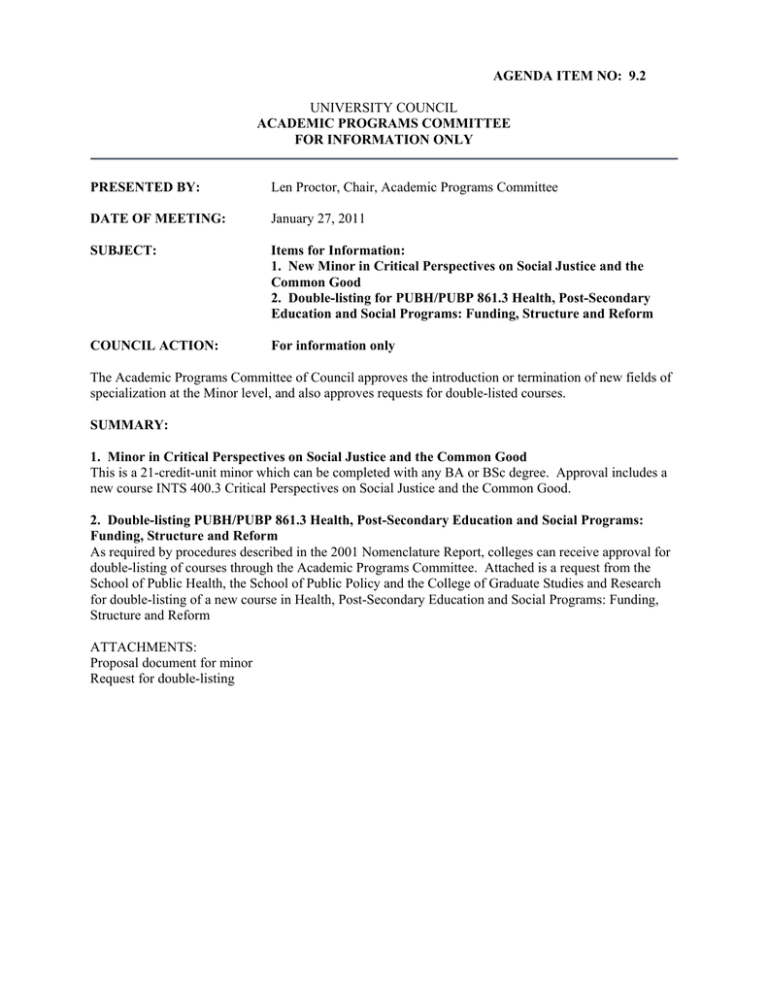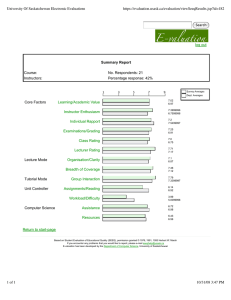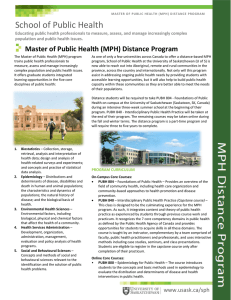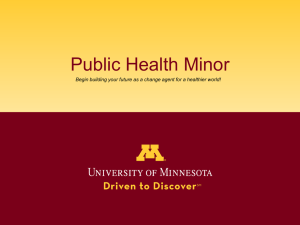AGENDA ITEM NO: 9.2 ACADEMIC PROGRAMS COMMITTEE FOR INFORMATION ONLY
advertisement

AGENDA ITEM NO: 9.2 UNIVERSITY COUNCIL ACADEMIC PROGRAMS COMMITTEE FOR INFORMATION ONLY PRESENTED BY: Len Proctor, Chair, Academic Programs Committee DATE OF MEETING: January 27, 2011 SUBJECT: Items for Information: 1. New Minor in Critical Perspectives on Social Justice and the Common Good 2. Double-listing for PUBH/PUBP 861.3 Health, Post-Secondary Education and Social Programs: Funding, Structure and Reform COUNCIL ACTION: For information only The Academic Programs Committee of Council approves the introduction or termination of new fields of specialization at the Minor level, and also approves requests for double-listed courses. SUMMARY: 1. Minor in Critical Perspectives on Social Justice and the Common Good This is a 21-credit-unit minor which can be completed with any BA or BSc degree. Approval includes a new course INTS 400.3 Critical Perspectives on Social Justice and the Common Good. 2. Double-listing PUBH/PUBP 861.3 Health, Post-Secondary Education and Social Programs: Funding, Structure and Reform As required by procedures described in the 2001 Nomenclature Report, colleges can receive approval for double-listing of courses through the Academic Programs Committee. Attached is a request from the School of Public Health, the School of Public Policy and the College of Graduate Studies and Research for double-listing of a new course in Health, Post-Secondary Education and Social Programs: Funding, Structure and Reform ATTACHMENTS: Proposal document for minor Request for double-listing Proposal for Curriculum Change University of Saskatchewan to be approved by University Council or by Academic Programs Committee 1. PROPOSAL IDENTIFICATION Title of proposal: Critical Perspectives on Social Justice and the Common Good Degree(s): B.A. and B.Sc. Field(s) of Specialization: ALL Level(s) of Concentration: Minor Option(s): Degree College: Arts & Science Home College: Arts & Science Department: Division of Social Sciences Contact person(s) (name, telephone, fax, e-mail): Patti McDougall ph: 966-8919 fax: 966-8904 pmcdougall@stmcollege.ca Date: December 21, 2010 Approved by the degree college and/or home college: September 24, 2010 Proposed date of implementation: September 2011 2. Type of change Requiring approval by Academic Programs Committee Addition of a new Field of Specialization at the Minor Level of Concentration. Proposal Document 3. RATIONALE The new minor concentration in Critical Perspectives on Social Justice and the Common Good provides students with opportunities to consider critical social problems and cycles of exclusion with a focus on analyzing how people are treated, how decisions are made and the extent to which fairness, reasonableness and the structures of society factor into these problems (or solutions). Certain courses within the proposed minor include community service/experiential learning opportunities that are intended to heighten awareness of an engagement with the problems of inequality and marginalization, both locally and internationally. The INTS 200.6 is included as a core course because it provides students with the foundational and preparatory concepts and introduces themes students will encounter in other courses taken in the minor. The INTS 400.3 course is designed to provide students with an in depth treatment of the topics of "social justice" and the "common good" affording the opportunity for integration. The proposed minor concentration fills a gap in available interdisciplinary programming of this kind and provides students with a minor option that would be of benefit in the pursuit of careers and/or graduate training within numerous human service areas (e.g., education, law, business, social work, ministry, community development, social activism, public administration and politics). The minor can be distinguished from, but also complements, the existing specialization in Aboriginal Justice and Criminology as well as the minor in Crime, Law and Justice Studies both of which are fulfilled through courses in Sociology and are designed to facilitate careers in criminal justice and law-related fields. This proposal stems, in part, from the Academic Partnership Agreement between St. Thomas More College and the College of Arts and Science, which encourages STM to develop courses, programs and streams that reflect its unique academic expertise. By building on existing strengths and by providing a distinctive program option, the minor helps to realize St. Thomas More College's strategic initiative to heighten our identity as the Catholic Liberal Arts College on the campus of the U of S. There are numerous examples of similar program offerings across North America in smaller Catholic colleges like STM, as well as in larger public and private institutions (e.g., King's College at the University of Western Ontario, University of Regina). The proposed minor concentration also fits well with the Integrated Plan for the College of Arts and Science (2008-2012). Specifically, the minor enhances the student experience through engaged learning, provides an innovative program option at the undergraduate level, and creates new and attractive opportunities for students that can be linked to exciting academic growth and career choices. 4. DESCRIPTION OF PROGRAM CHARACTERISTICS The Minor in Critical Perspectives on Social Justice and the Common Good is an interdisciplinary course of study using the collected insights of various academic disciplines designed to prepare students to be responsible critics of contemporary societies and effective agents for positive social transformation. Students will reflect on the causes and structures of injustice and approaches to social change at interpersonal, communal, national and global levels. As a central concept in Catholic thought on social justice, the Minor will explore the role of the common good in the religious, ethical, philosophical and social science traditions. As part of their course of study, students will be challenged to critically examine historical and contemporary misappropriation and abuse of the constructs of social justice and common good. Through a community service-learning pedagogy, offered in a number of courses, this minor creatively engages faculty, students, and community partners in local and international responses to inequality and marginalization. Cycles of exclusion (e.g., marginalization associated with disability, age, gender, poverty, sexuality, racism, violence, colonialism, post-colonialism, class, speciesism and the environment), urban justice, globalization, and ecojustice are the areas of concentration for empirical, social analyses of social injustice. From these areas of concentration and issues of justice students gain a solid intellectual and ethical grasp of the understandings of the common good. The Minor, consisting of 21 credit units of courses, may be completed in conjunction with any Three-Year, Four-Year, or Honours degree. Requirements: INTS 200.6 Cultivating Humanity INTS 400.3 Critical Perspectives on Social Justice and the Common Good (new course - subject to approval) The INTS 200.6 and INTS 400.3 courses are coordinated and delivered by STM faculty, under the academic authority of the College of Arts and Science. The remaining 12 credit units required to complete the minor may be taken from the list that follows. At least 3 credit units must be at the 300- or 400-level and courses must be taken from at least two different departments. In addition, of the 12 credit units required to complete the minor at least 3 credit units must be taken from the Humanities and 3 credit units must be taken from the Social Sciences. Humanities CTST 200.3 Introduction to Catholicism PHIL 226.3 Environmental Philosophy PHIL 231.3 Ethical Problems PHIL 234.3 Biomedical Ethics PHIL 262.3 Social and Political Philosophy PHIL 337.3 Philosophy of Law RLST 220.3 Women in Western Religious Traditions RLST 228.3 Jewish Religious Thought RLST 312.3 Gender and God-Talk Social Sciences ANTH 231.3 Cross Cultural Perspectives on Health Systems ANTH 310.3 Anthropology of Gender ANTH 326.3 Principles of Applied Anthropology ANTH 330.3 Oral History and Storytelling: Anthropological Perspectives ECON 221.3 Women and the Economy ECON 223.3 Labour Economics ECON 270.3 Economic Development in Non-Industrial Countries ECON 272.3 Economics of Transition ECON 277.3 Economics of the Environment POLS 237.3 Modern Political Theory POLS 246.6 Politics of the Third World POLS 250.3 Political Sociology of the State and Society POLS 251.3 The Political Sociology of Political Change POLS 260.6 International Relations POLS 336.3 Contemporary Political Thought POLS 349.3 The Public Policy of Multiculturalism in Canada POLS 370.3 War, Peace and International Order POLS 466.3 Ethnic Conflict and Democracy PSY 231.3 Psychology and the Law PSY 261.3 Community Psychology PSY 361.3 Advanced Community Psychology SOC 214.3 Social Deviance and Social Control SOC 220.6 Sociology and Social Welfare Organization SOC 242.3 An Introduction to Sociology of Women's Studies SOC 260.3 Social Change and Social Solidarity SOC 261.3 Engaging Social Change and Social Solidarity SOC 296.3 Analysis of Modernity SOC 304.3 Contemporary Marxist Sociology SOC 305.3 Ethnic Stratification SOC 306.3 Contemporary Class Structure SOC 328.3 Social Inequality and Health SOC 360.3 Globalization and Social Justice SOC 422.3 Social Stratification and Social Mobility 5. RESOURCES Any costs associated with the new Minor will be funded within existing resources and budgetary plans of St. Thomas More College. Currently, STM faculty are involved in teaching the majority of the above courses; some of these courses are also offered by faculty in Arts and Science Departments and still others are exclusively offered by Arts and Science. STM will ensure that an adequate selection of courses in the Minor are regularly offered. STM and Arts and Science have jointly established a governance model and academic reporting structure within which this Minor will operate. The Minor Program in Critical Perspectives on Social Justice and the Common Good will be overseen by an interdisciplinary Administrative Committee composed of faculty members from STM and faculty members from Arts and Science. Members of the Committee will be selected on the basis of expertise and will represent at least three (3) departments participating in the Minor. The Administrative Committee will meet regularly to discuss the implementation of the Minor, address any required changes or curriculum reviews, and consider any academic or administrative issues that arise. One STM member will serve as Chair of the Committee as well as Program Advisor for the Minor. The Chair/Program Advisor will oversee the day to day management of the Minor. STM will assume responsibility for providing financial and administrative support to this interdisciplinary Administrative Committee. 6. RELATIONSHIPS AND IMPACT OF IMPLEMENTATION The new program will likely have little impact on other programs, since it does not duplicate existing programs and involves the continued offering of existing courses. At the time of implementation, the program will add one new course to the curriculum (INTS 400.3) which is distinct from existing courses. 7. BUDGET Teaching and other course expenses will be accommodated within existing budgets. College Statement From Harley Dickinson, Vice Dean, Division of Social Sciences, College of Arts and Science The College of Arts and Science supports the proposed interdisciplinary Minor in Critical Perspectives on Social Justice and the Common Good. The proposed Minor is based on existing courses in Arts and Science and one new course taught by STM faculty. This creates a new option for students with no resource implications for the College of Arts and Science. Minors are increasingly desired by students, who believe that the additional recognition provides them with an advantage in their pursuit of a career. The College believes that new minors, which provide students with additional opportunities to explore subject matter outside their major, are a valuable, if not essential way to enhance the student learning experience. Support for the development of new minors in the College is explicitly included in the College’s Second Integrated Plan, Section 2.2.3.1 (available at: https://claws.usask.ca/astab/docs/IP/CollegeOfArtsAndScience_IntegratedPlanCollegeSubmission.pdf). The proposal was submitted to the College of Arts and Science Course Challenge for March 2010. It was approved by the committee on Academic Programs and Standards for the Humanities, Fine Arts, and Social Sciences on May 7, 2010, by the Division of Humanities and Fine Arts on September 22, 2010 and by the Division of Social Sciences on September 24, 2010. [available from the Office of the University Secretary] Consultation Forms Consultation with the Registrar form New course: INTS 400.3 Critical Perspectives on Social Justice and the Common Good Expected Registration: 15-20 students. Prerequisite(s): 36 credit units of completed study including INTS 200.6 Course Description: Critical Perspectives on Social Justice and the Common Good (SJCG) is an advanced seminar meant as a capstone for students completing a Minor in Critical Perspectives on Social Justice and the Common Good. Students will be engaged in a critical inquiry into current conditions of social life to inspire their participation in equitable and sustainable alternatives for a common global and social good. Following scholars like Lisa Cahill (2005), we will consider critical questions including, for example: "What is the substance or content of the common good? Is there a genuine commitment to the common good, in contrast to self-interest? Is there a moral will, manifested in dispositions of solidarity and hope, to implement the common good?" (pp.45-46) The struggle for Social Justice involves both an analysis of social systems and cycles of exclusion, as well as an appreciation for one’s own personal responsibility for individual and collective action. The course is organized around four core categories including cycles of exclusion, rural/urban justice, ecojustice and globalization. Course Objectives: In this course we begin by situating the terms social justice and the common good. We examine the confrontation between a sense of universal principles and historical-cultural heritages and explore how this tension pertains to justice for the private individual, the notion of human rights, the economic and the social structures of civil society, and political institutions. This course will include emphasis on contemporary social justice issues with a view to helping students understand that social justice is not just an individual enterprise but rather unfolds through movements in history and is often collectively rooted. The main individual learning objectives for this course include: (1) Students will have the opportunity to integrate previous course work in the areas of concentration included within the Minor in Critical Perspectives on Social Justice and the Common Good (i.e., courses involving cycles of exclusion, urban justice, globalization, and ecojustice). (2) Students will become aware of radical inequality both locally and globally and will continue to develop their competency to engage socially by reflecting critically upon their existing social commitments with a view to increasing one’s own effectiveness. (3) Students will continue to develop the capacity to monitor and deliberate upon systemic social problems. (4) Students will be exposed to a classic pedagogical model involving reflection, judging and acting (Ryan, 2004) that connects directly to historical consciousness, critical reflection and actions for justice. Course Format and Role of the Instructor: This seminar will actively involve students in planning and presenting material related to the goals of the course. The instructor will be responsible for covering key material to lay the foundation for the course and will also serve as a resource and guide for students as they explore the issues raised by the literature and present their perspectives to the class. Among the College of Graduate Studies and Research MEMORANDUM To: Cathie Fornssler, Secretary Academic Programs Committee of University Council From: Trever Crowe, Associate Dean College of Graduate Studies and Research Copies: Dr. R. Buckingham, Dr. M. Atkinson, Dr. A. Backman, Dr. L. Martz Date: December 20, 2010 Re: Double listing PUBH/PUBP 861 The Graduate Student Affairs Committee within the College of Graduate Studies and Research recommends approval of the request by the School of Public Health and the Johnson-Shoyama Graduate School of Public Policy to double list the course, “PUBH 861.3 Health, Post-Secondary Education and Social Programs: Funding, Structure and Reform” as PUBH 861.3 and PUBP 861.3, with the same course name. During its meeting on December 16, 2010, the committee considered the arguments explained in the attached memorandum from Dr. Buckingham. After considerable discussion, the committee passed the motion, “The Graduate Student Affairs Committee in the College of Graduate Studies and Research recommends approval of double listing PUBH/PUBP 861: Health, PostSecondary Education and Social Programs: Funding, Structure and Reform on a nonprejudicial basis and as an isolated case.” If questions arise during the review of this recommendation by APC, I would be happy to respond. UNIVERSITY OF SASKATCHEWAN School of’ Public Health School of Public Health 107 Wiggins Road Saskatoon SK SiN 5E5 Canada Telephone: (306) 966-8544 Facsimile: (306) 966-7920 Email: schoo1.puhlichealth(usask.ca www.usask.ca/sph MEMORANDUM TO: Dr. Trever Crowe, Associate Dean, College of Graduate Studies & Research CC: Kelly Clement Dr. Lawrence Martz, Dean, College of Graduate Studies & Research FROM: Dr. Robert W. Buckingham Executive Director, School of Public Health DATE: December 2, 2010 RE: Request to double-list PUBH 861 as PUBH/PUBP 861 As the Executive Director of the School of Public Health, I humbly request that the College of Graduate Studies and Research accepts the double-listing of PUBH 861 as PUBH/PUBP86 1. This request is based on four important points, as outlined below. First, PUBH 861 has been approved through Course Challenge as of July 7, 2010. This is a request to double-list an existing course. Second, the request for double-listing is made primarily on extraordinary operational grounds to ease the transfer of a well-established, full-time faculty member (Dr. Janice MacKinnon) from Johnson-Shoyama Graduate School of Public Policy (JSGSPP) to the School of Public Health (SPH). The faculty member has an unusually strong background in the area of public policy; as an academic, as a member of government and as a member of public policy NGO’s such as the Canada West Foundation. The faculty member wishes to maintain a strong and visible link to the public policy arena and to JSGSPP following a transfer of tenure to SPH. The faculty member believes that double-listing of this particular course was understood to be a key element of her transfer. Third, by allowing double-listing it will be easier for students already in programs in JSGSPP to take this course for credit as a PUBP course to meet program requirements as they are currently articulated. 13 School of Public Health 107 Wiggins Road Saskatoon SK S7N 5E5 Canada Telephone: (306) 966-8544 Facsimile: (306) 966-7920 Email: school.publichealth(usask.ca www.usask.calsph Fourth and final, the request is being made to support the activities of an individual faculty member in very unusual circumstances on a one-time basis. If the request is honored, it will not be viewed by SPH as setting a precedent. The SPH fully understands and accepts the reservation of University Council regarding the double-listing of courses. They agree that any and all future requests that might arise from SPH will be based on compelling programmatic needs and will address the concerns regarding double-listing raised in the Nomenclature Report (2001). I suspect this letter will satisfy your requirements. I am appreciative of your willingness to work with the SPH to ensure that each and every student receives the greatest quality education, and most enjoyable experience with the University of Saskatchewan. Sincerely, // Dr. Robert W. Buckingham Executive Director, School of Public Health . 14 Excerpt from June 23, 2010 University Course Challenge:; PUBH 861.3 – Health, Post-Secondary Education and Social Programs: Funding, Structure and Reform Prerequisite: PUBH 867 or departmental permission. Calendar Description: The course will establish the foundations for the current funding of health care, post-secondary education and Canadian Social Programs. The course will also consider the main elements of a budget. The major assignment for the class will involve students working together to compile a provincial budget. Every province faces the same budgetary challenge: how to continue to fund the rapidly increasing costs of health care while at the same time maintaining the quality of other programs and services. Rationale: It is important for students of health policy and public policy to develop an appreciation for the funding mechanisms and processes that determine the provision of state services. This need will be satisfied by providing students with an experiential learning opportunity to create a provincial budget, including the consultations that occur with lobby groups and key stakeholders. One side of budgeting involves expenditures. The course will consider various forms of spending and will focus specifically on health care, social programs that support families and seniors, and programs that provide funding of students, universities and research. The other side of budgeting is the raising of revenue to fund programs. The course will consider various forms of taxation, and consider whether Saskatchewan should follow the lead of other provinces and harmonize its sales tax with the federal GST. It will also consider whether there are alternative ways to fund health care and social programs. The course will also consider the various policy tools used to reform Canadian social programs and post-secondary education and discuss why similar reforms have not occurred in health care. The main reports advocating reform of Canada’s health care system, such as the Romanow, Kirby, Mazankowski, and Fyke reports will be discussed and their recommendations assessed. Contact Person: a.backman@usask.ca Approval: Graduate Student Affairs Committee, June 15, 2010 Please note that this course is also being submitted for double-listing in the School of Public Policy as PUBP 861.3. Following approval of the course through University Course Challenge, the double- listing request will be dealt with by the Academic Programs Committee Professor Janice MacKinnon janice.mackinnon@usask.ca PUBH 861 & PUBP 861 – Health, Post-Secondary Education and Social Programs: Funding, Structure and Reform Course Outline Why has it been possible to make fundamental changes in Canadian social programs and post-secondary education, while reforming the Canadian health care system has proven difficult? What are the best ways to measure the effectiveness of health care, postsecondary education and social programs? Why do governments in Canada spend relatively little money on preventative health care services, despite evidence showing their effectiveness? These are the kinds of questions that will be the discussed in the class. The course will begin by establishing the foundations for the current funding of health care, post-secondary education and Canadian social programs. When the federal government created an array of social programs during and after World War II, it established an important framework for future Canadian social policy. The cost of the programs contributed to the fiscal crisis of the 1990s and the federal transfer payments to the provinces to fund the programs complicated the design, administration and fiscal accountability of the programs. The course will also consider the main elements of a budget. The major assignment for the class will involve students working together to compile a provincial budget. Every province faces the same budgetary challenge: how to continue to fund the rapidly increasing costs of health care while at the same time maintaining the quality of other programs and services. One side of budgeting involves expenditures. The course will consider various forms of spending and will focus specifically on health care, social programs that support families and seniors, and programs that provide funding to students, universities and research. The other side of budgeting is the raising of revenue to fund programs. The course will consider various forms of taxation, and consider whether Saskatchewan should follow the lead of other provinces and harmonize its sales tax with the federal GST. It will also consider whether there are alternative ways to fund health care and social programs. The course will also consider the various policy tools used to reform Canadian social programs and post-secondary education and discuss why similar reforms have not occurred in health care. The main reports advocating reform of Canada’s health care system, such as the Romanow, Kirby, Mazankowski, and Fyke reports will be discussed and their recommendations assessed. 1 The course will also teach students how to write key government documents, such as briefing notes and budget material. To help students with these assignments, there will be one–on-one meetings with the professor. Assignments: Students will also be required to prepare a briefing note on one of the topics described in the class outline. The briefing note should include: a precise definition of the issue, background information, an analysis of the various dimensions of the problem, and a recommended response. An overview of the briefing note will be presented orally during the class in which the issue is being covered. The oral presentation will allow students to test their arguments and receive feedback before preparing their final drafts. A final written copy of the briefing note, which should be from 8 to 10 pages in length, will be due at the end of the term. The topics for the briefing note are as follows: 1) Do the provinces have sufficient funds to properly finance the health, post-secondary education and social programs that are provincial responsibilities? Write a briefing note for the federal government assessing the merits of the argument by the provinces and the territories that there is a vertical fiscal imbalance. Include a communications strategy. 2) Did the 2007 Federal Budget provide a stable, long-term foundation for funding health care, post-secondary education and social programs? Write a briefing note for the Saskatchewan government assessing the 2007 federal budget and its implications for funding these programs and for stabilizing provincial finances. 3) Is it good social policy to allow single income families to split their incomes and thereby reduce the taxes they pay? Is it good fiscal policy? Write a briefing note for the federal government discussing the advantages and disadvantages of income splitting. 4) Write a briefing note for the government of Saskatchewan on the issue of addressing the fiscal problems of health care by instituting either user fees for some services or by making some health care services a taxable benefit. 5) Can Canadians afford a universal child care program? Write a briefing note for the federal government discussing the affordability of implementing a universal child care program. 6) Should social programs be available to all, despite income or financial need, or should they be targeted to those in need? Write a briefing note for the Government of Saskatchewan on the advantages and disadvantages of universal versus target social programs. 7) Is it good public policy for governments to impose tuition freezes on post-secondary educational institutions? Write a briefing note on the topic for the government of 2 Saskatchewan. Include a communications strategy to explain the recommended response to students, faculty and university administrators. 8) Does the Romanow Report on health care, which was commissioned by the federal government, provide solutions to the problems of Canada’s health care system from a provincial perspective? Write a briefing note for the province of Saskatchewan assessing the major implications for provincial governments of the Romanow Report (Building on Values: Report of the Commission on the Future of Health Care) . 9) Does the Kirby Report on health care, which was produced by the Canadian Senate, provide solutions to the problems of Canada’s health care system from a provincial perspective? Write a briefing note for the province of Saskatchewan assessing the major implications for provincial governments of the Kirby Report (The Health of Canadians: The Federal Role). The other main assignment will involve working with other students to compile a provincial budget. Each student will be assigned a specific ministry, such as the ministry of finance, health etc. and will be responsible for compiling the appropriate budget material for that ministry. However, students will also act as Treasury Board Ministers and work as a group to make the decisions about the allocation of the available resources to the various ministries and the development of an overall theme for the budget. Students will be expected to prepare a budget package which will include: an analysis and overview of the main issues and challenges involved in the area, the pre-budget messages that should be communicated to the public, the budget allocations in the area and the rationale for these allocations, the part of the budget speech that deals with the particular ministry and the post-budget communication strategy. Each student will present the overview of the budget for their ministry to the class. This will provide an opportunity for students to test their ideas and receive feedback before compiling their final budget package. The final written version of the budget package, which should be approximately 15 to 20 pages in length, will be due at the end of the term. The marks will be allocated as follows: Class Participation…………………40% Briefing Note oral presentation and written assignment…………… 20% Budget oral presentation and written assignment……………..40% As well as the required readings, the class will track media coverage of important current policy issues. Students should scan the Star-Phoenix and the Globe and Mail ( available on-line) to monitor such issues. 3




